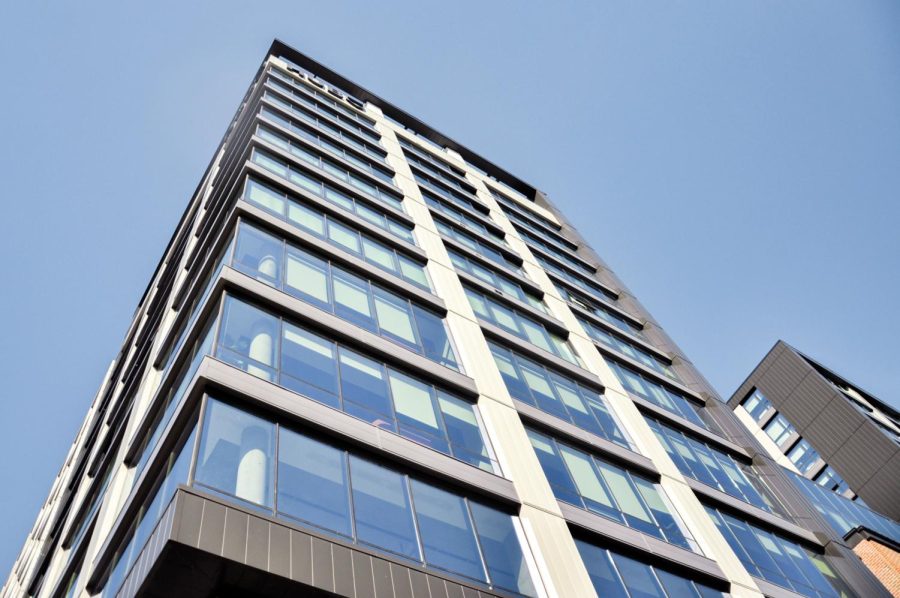Opinion | Luxury apartments display societal shift
Columnist Dan Kibler argues that the sight of luxury apartments attracts more students away from the possibilities of owning a home due to high housing costs.
September 30, 2022
If you have been around the University of Illinois for the past two decades or so, you would notice the environment on campus has shifted. The campus has gone from resembling any other prairie town that dots the Corn Belt to a small metropolis that feels like a midwestern Silicon Valley.
A big part of this shift has to be accredited to the massive luxury apartment buildings that give the University a trendy and affluent feel.
If you live or have been to places like HERE or The Dean Campustown, you understand this feeling. The apartments are beautiful, with access to stunning views from rooftop lounges and pools making the prices worth shelling out. However, these places serve as insight into very important societal trends.
Luxury apartments work well in the university setting, where the wealthiest students can spend extravagantly to get the best living situation. However, luxury apartments like The Dean and HERE are actually part of a growing trend amongst young people across the nation.
Rather than investing in houses or land like was seen among Baby Boomers and Gen X, Millennials and Gen Z seem inclined to find apartments with amenities, the very same luxury apartments we enjoy here on campus.
Get The Daily Illini in your inbox!
The interesting thing to note here is that this is not necessarily due to desire or preference. It has been noted that most young people still have dreams of one day buying a house to call their own, but are often unable to due to stagnating wages, high housing prices and inflation.
It is concerning, at least, for many to admit that young people are being locked out of home and land ownership and therefore are blocked from building generational wealth and are relegated to living in apartments.
There are many theories that speculate on what this could mean for society as a whole, but one such interesting theory discusses how this could be related to available positions in society.
Famed historian Peter Turchin coined this theory as “Elite Overproduction.” Simply put, elite overproduction occurs when society has a specified amount of positions for “elites” (think doctors, engineers and lawyers) but too many qualified people to fill those positions. Therefore, society becomes hyper competitive and unstable as highly qualified people are stuck in the lower rungs of society because there simply isn’t enough space for everyone on top.
Luxury apartments show a compelling argument for the legitimacy of this theory, especially as millennials are owning homes 10s of percentage points less than any generation this nation has seen in decades.
Having qualified elites stuck at the bottom is not the best for a lot of reasons. Turchin theorized that the elites that were left out of the system would eventually become radicalized politically, growing to resent the system that misled them. He compares it to deadwood in a forest, acting as kindling for a future upheaval that has the potential to become unstoppable.
He theorized that such a concept has played a key role in many historical upheavals (the Fall of Rome and the European Wars of Religion, namely) and eerily predicted in 2010 that the U.S. would be entering a similar phase of “elite overproduction” by 2020.
Before stocking up on food and water and preparing for the apocalypse, it should be noted that Turchin himself says that this “elite overproduction” cannot predict exactly how a future upheaval will happen, but merely increases the odds of one.
In the context of Champaign-Urbana, apartments exist not as a replacement for home ownership, but as nice college housing for those among us who can afford it. Where there is a demand, there will be a market to meet that demand.
However, as a broad trend, luxury apartments seem to be replacing houses for a lot of young people, and the long-term ramifications of that are yet to be seen, with colleges simply being the first taste of it.
We live in an increasingly unstable world, but luckily for us, our campus often gives us a sense of security, seemingly disconnected from the outside world. However, the rapidly changing times still dimly illuminate the corners of our lives.
Are luxury apartments symptomatic of underlying social instability? Maybe. Nevertheless, it is fascinating how even minuscule details of the average college student’s life, when put in the context of social trends, could shed insight into the future.
Dan is a junior in LAS.







